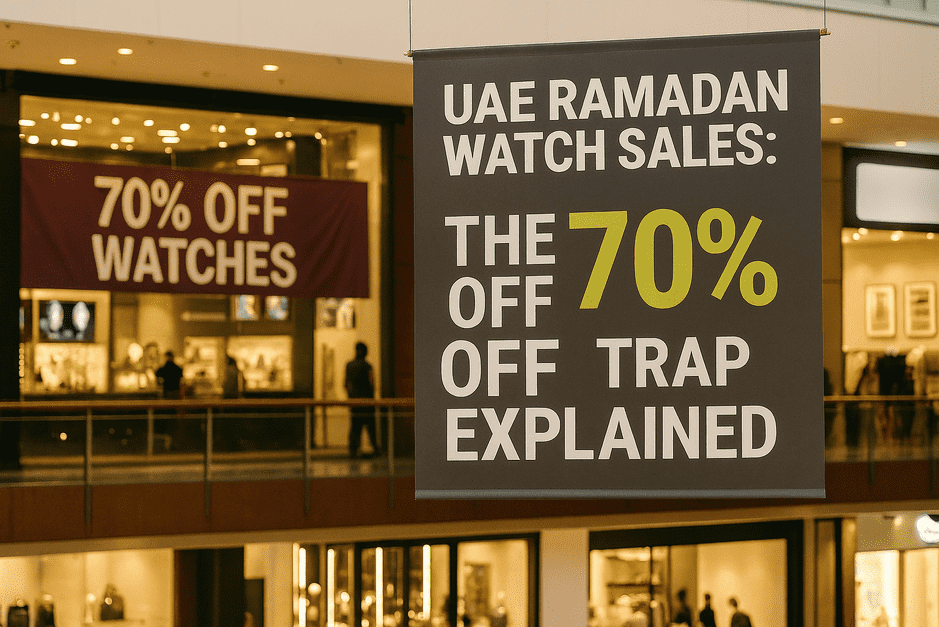Quick Answer: Are Ramadan Watch Discounts in the UAE Real?
UAE Ramadan Watch Sales attract thousands of shoppers each year, promising huge 70% discounts on luxury watches. In reality, most of these “offers” rely on inflated original prices, making it hard to find genuine bargains. The key is understanding how these sales operate, comparing prices, and spotting real deals before buying.
Table of Contents
- Why Dubai Watch Sale Deals Look Attractive
- How Ramadan Shopping Festival Watches in UAE Are Marked Up
- Real-Life Examples from UAE Watch Sales
- How to Check If Discounts Are Genuine
- Practical Tips for Buying Watches During UAE Ramadan Sales
- FAQ
Why Dubai Watch Sale Deals Look Attractive
During Dubai watch sale deals, malls and online platforms promote heavy discounts. Posters and online banners showcase luxury watches at slashed prices. Shoppers are drawn to the perceived prestige and bargain.
Market research shows that over 60% of Ramadan luxury watch offers in UAE malls are priced above global retail averages.
How Ramadan Shopping Festival Watches in UAE Are Marked Up
Retailers use anchor pricing. A watch normally priced at AED 2,000 may be listed at AED 5,000 pre-Ramadan. When the “70% discount” appears, it drops to AED 1,500. Buyers feel they saved big, but real savings are minimal.
The key is to check the true market price before trusting flashy discounts.
Real-Life Examples from UAE Watch Sales
- Omega Seamaster: Pre-Ramadan AED 15,000 → Inflated AED 25,000 → Ramadan “deal” AED 12,500. Actual saving: 16%.
- Fossil Chronograph: Global online AED 450 → UAE pre-sale AED 800 → Ramadan offer AED 499. Actual saving: ~AED 50.
Check global marketplaces like Chrono24 to verify prices.
How to Check If Discounts Are Genuine
- Compare prices internationally via brand websites.
- Look for official hallmarks and certifications (see Understanding BIS Hallmark: What It Means for Your Jewellery).
- Monitor mid- and high-end watches on global platforms like Chrono24.
- Track UAE mall prices over time.
Practical Tips for Buying Watches During UAE Ramadan Sales
- Shop in the final three days of Ramadan, when real discounts appear.
- Request receipts showing pre-sale prices.
- Stick to trusted retailers in Dubai Mall or Mall of the Emirates.
- Cross-check prices online before buying.
For more tips, see 24K, 22K, 18K: What Every Malayali Gold Buyer Must Know and Expert Experience in Gemology and Luxury Watches
FAQ
Q1: Are UAE Ramadan watch sales always fake?
No. Genuine deals exist, mostly on outlet or clearance models.
Q2: What is the typical real discount?
Average savings range between 10–25%.
Q3: Should I shop online or in malls?
Online platforms like Amazon.ae are often more transparent, but always compare prices.
Q4: How do I spot inflated prices?
Check at least two UAE retailers and the brand’s global website for reference.
Introduction
This Responsible Travel FAQ provides comprehensive answers to help you make ethical tourism choices.
Our guide covers eco-friendly accommodations, local community support, sustainable transportation, cultural respect, wildlife ethics, and ways to reduce waste.
Following these practices ensures your adventures benefit both destinations and travelers.
What is Responsible Travel and Why Does It Matter?
Responsible travel means making conscious choices that minimize negative impact while maximizing benefits for local communities and the environment.
Tourism generates $1.4 trillion annually but produces 8% of global carbon emissions.
Your travel decisions affect local economies, cultural preservation, and environmental conservation.
How Do I Choose Sustainable Accommodations?
Look for eco-certifications such as:
- Green Key
- LEED building standards
- EarthCheck approval
- Rainforest Alliance verification
Check if hotels use renewable energy, water-saving systems, and source food locally.
Ask about waste reduction programs and community involvement. Calling properties directly helps verify claims.
Transportation Options for Responsible Travel
- Train travel emits 80% less carbon than flying for similar distances.
- Choose direct flights when necessary and book economy class.
- Use public transport, bicycles, or walk instead of renting cars.
- Consider verified carbon offsets for unavoidable flights.
Supporting Local Economies
- Buy from locally-owned businesses instead of chains.
- Book community-based tours with local guides.
- Eat at family-owned restaurants with local ingredients.
- Stay in homestays or boutique hotels rather than international chains.
- Purchase authentic handicrafts fairly from artisans.
Packing Tips for Responsible Travel
- Reusable water bottle with filtration
- Solid toiletries to reduce plastic
- Reef-safe mineral sunscreen
- Reusable shopping bags
- Bamboo or metal utensils
- Portable laundry soap
Pack light and choose durable, multipurpose items.
Respecting Local Cultures
- Learn cultural customs, dress codes, and etiquette.
- Learn basic local phrases.
- Dress appropriately for religious and conservative areas.
- Ask permission before photographing people.
- Participate respectfully in cultural activities.
Ethical Wildlife Encounters
- Maintain safe distances and avoid feeding animals.
- Choose conservation-focused sanctuaries, not entertainment attractions.
- Avoid elephant rides, direct contact, or photo opportunities with captive animals.
- Use certified naturalist guides who prioritize welfare and habitat protection.
Reducing Waste During Travel
- Use reusable containers, bags, and utensils.
- Refuse single-use plastics.
- Choose digital tickets and receipts.
- Carry a small trash bag where disposal is limited.
Questions to Ask Tour Operators
- Are staff local and fairly paid?
- How does your business give back to communities?
- What environmental practices are in place?
- Are group sizes limited to reduce pressure on sensitive areas?
- Are wildlife experiences ethical and conservation-focused?
Money and Overtourism Practices
- Use local ATMs and tip according to local customs.
- Support social enterprises and cooperatives.
- Visit during shoulder seasons, off-peak hours, or lesser-known areas.
- Stay longer in fewer destinations.
Responsible Travel on a Budget
- Cook using local market ingredients.
- Use public transportation.
- Stay in local hostels, guesthouses, or homestays.
- Explore free cultural events or walking tours.
- Exchange skills or volunteer for free accommodation.
Pre-Travel Research
- Learn about environmental challenges and cultural sensitivities.
- Check seasonal weather and political situations.
- Identify local organizations to support.
- Read destination-specific responsible travel guides.
Creating a Positive Impact Post-Travel
- Share authentic stories on social media.
- Write detailed reviews for responsible businesses.
- Continue supporting local organizations.
- Apply sustainable practices in daily life.
- Recommend responsible travel to others.
Learn more:



